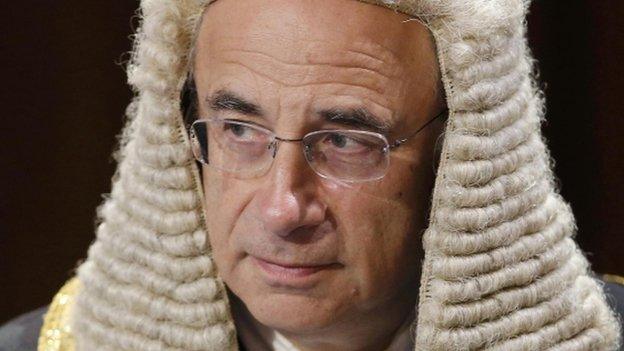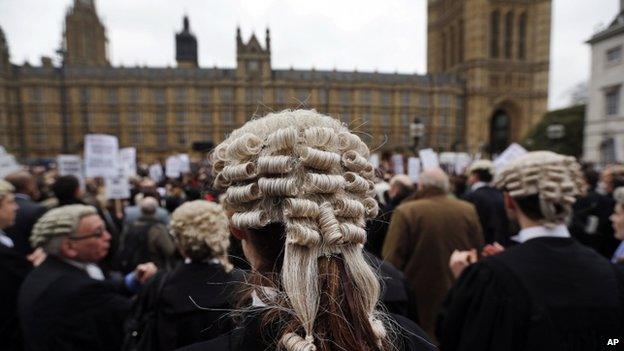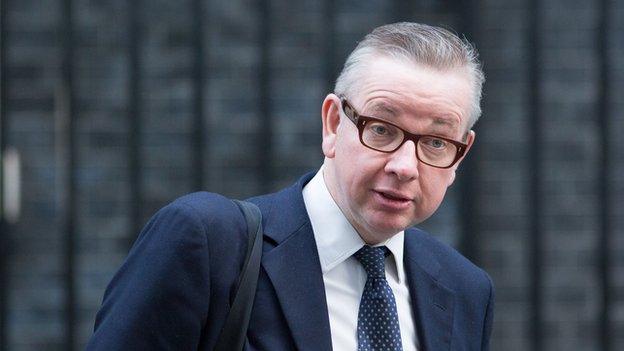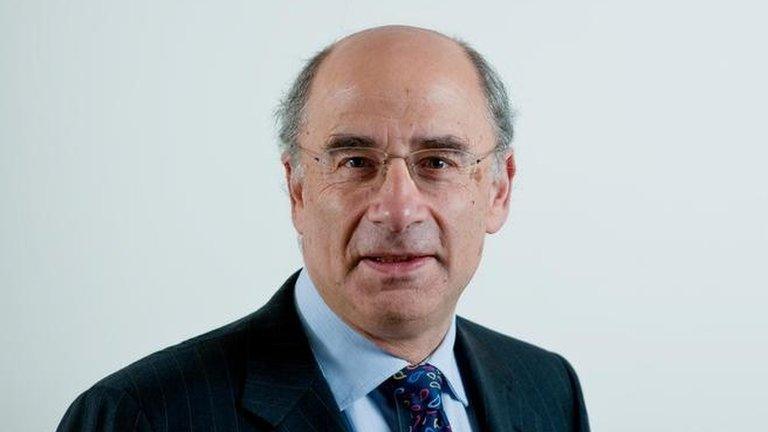Michael Gove: Justice system fails society's poorest
- Published
Michael Gove: "It's impossible not to wonder what century our courts are in"
The "creaking and outdated" justice system in England and Wales is failing society's poorest, Justice Secretary Michael Gove has said.
The best legal provision was the preserve of the wealthy, while victims of crime are "badly" let down, he said.
He is seeking a £700m investment in the courts to make better use of technology and speed up trial procedures.
Mr Gove has also indicated that he would like to "revisit" aspects of Freedom of Information (FOI) rules.
He said there had been "worrying tendency" for the courts to erode exempted areas and the case for ministers to get advice from their civil servants in a "safe space" - beyond the reach of FOI - needed to be re-asserted.
Follow all the day's developments on Politics Live
In his first speech since being appointed lord chancellor and secretary of state for justice last month, Mr Gove also said he would review the legal aid system amid criticism of cuts to fees made by his predecessors, Ken Clarke and Chris Grayling.
Speaking at the Legatum Institute in London, the former education secretary and chief whip said that while the UK's "global reputation" for legal services was "deserved", not all of it was "world-beating".
"There are two nations in our justice system at present," he said.
"On the one hand, the wealthy, international class who can choose to settle cases in London with the gold standard of British justice. And then everyone else, who has to put up with a creaking, outdated system to see justice done in their own lives.
"The people who are let down most badly by our justice system are those who must take part in it through no fault or desire of their own - victims and witnesses of crime, and children who have been neglected."

Key issues in Mr Gove's brief

Impact of cuts to legal aid and plans for further savings - read more here
The future of the Human Rights Act and a British Bill of Rights - read more here
Reforms to the court system in England and Wales - read more here
Changes to Freedom of Information rules - read more here
Penal policy: rehabilitation and the prison population - read more here

Making the case for reform of the criminal courts, the justice secretary warned of the "human cost" of the "waste and inefficiency" in the system.
He said too many cases were derailed by the late arrival of prisoners, video links that did not work and missing paperwork.
"It is the poorest in our society who are disproportionately the victims of crime, and who find themselves at the mercy of this creaking and dysfunctional system," Mr Gove said.
New technology
Prosecutions should be brought more efficiently and information should exchanged by email or conference call "rather than in a series of hearings", he argued, while evidence needed be served "in a timely and effective way".
In a report last year, senior judge Lord Justice Leveson said the criminal justice system in England and Wales needs wide-ranging change to make it more efficient and cheaper to run.
He has recommended greater use of video and conferencing technology in court rooms, timetables for evidence and lawyers speeches and the use of pictures gathered by police on cameras attached to their uniforms.
These innovations must be "implemented with all speed", Mr Gove said.
Lord Chief Justice of England and Wales Lord Thomas told the BBC he welcomed the proposed reforms, so as long as they are financed.
Mr Gove said he was "confident" he could secure the £700m funding that judges say are needed to overhaul the system.
While the Treasury were "never patsies" and would want to ensure the business case was "robust" he was sure the money would be made available, he told BBC Radio 4's World at One.
'Wheels coming off'
Bill Waddington, the chair of the Criminal Law Solicitors' Association, said his organisation had been pointing out problems with the courts system for years.
"If you take money and resources away from from the Crown Prosecution Service, if you take money and resources away from the police, if you close courts and you also, in addition, then cut legal aid, you've taken finance that is badly needed in there, out of the system, and it starts to creak.

Lord Justice Leveson has called for improvements to the justice system in England and Wales
"It's more than starting to creak, now the wheels are falling off it."
Andrew Caplen, President of the Law Society, told the World at One that he welcomed Mr Gove's programme of reform but he warned that it would not be possible unless the "chronic underfunding" that has dogged the system for "some years" was addressed.
Citizens Advice chief executive Gillian Guy said Mr Gove was "right" to look at ways to improve the experience for victims and witnesses in courts.
She also called for changes to the evidence domestic abuse victims are required to provide to get legal aid, warning that the system can currently make it "impossible" for some victims to get legal representation.
'Can do more'
On legal aid, Mr Gove rejected suggestions that he had been forced into a review of the changes made by Mr Grayling because of widespread opposition within the legal profession, saying it was always envisaged they would be looked at again.
"Both he and I would want to make sure that the most vulnerable always secure access to justice and secondly that we safeguard high-quality advocacy," he told the BBC.
He told the World at One that it was undoubtedly the case that the amount spent on legal aid prior to 2010 was "unsustainable", but he said people who needed it "are not being denied it".

Barristers protested against cuts to the legal aid budget last year
The justice secretary also said the profession "can do more", suggesting the "golden circle" of law firms should take on more pro-bono work.
As justice secretary, Mr Gove's responsibilities will also include implementing the Conservative Party's pledge to scrap the Human Rights Act and replace it with a British Bill of Rights.
The aim is to give the UK courts and Parliament - rather than European institutions - the final say in contentious cases but ministers have put legislation on hold pending a consultation on the way forward.
'Bemused'
Mr Gove told the World at One that while the government did not want to withdraw from the European Convention on Human Rights, it could not be ruled out if changes could not be not made.
"I want to be absolutely certain that traditional British liberties are safeguarded and enhanced and in order to get that right, we need to think hard, we need to talk openly and then legislate in a considered way," he said,
Labour said victims of crime and injustice would be "bemused" by what they described as Mr Gove's "hand-wringing rhetoric".
"Since the Tories took office access to justice has been all but dismantled for the poorest in our society," said shadow justice secretary Lord Falconer.
"The number of social welfare cases being granted funding has plummeted, victims of domestic violence are struggling to get help, employment tribunal fees are a significant barrier to workplace justice and the essential safeguard that is judicial review has been severely restricted."
- Published10 May 2015

- Published23 January 2015
